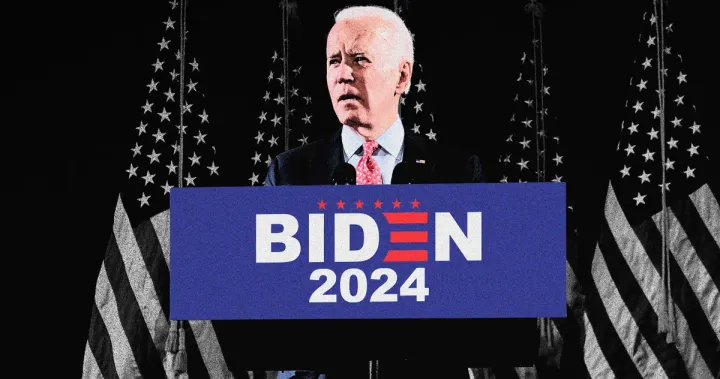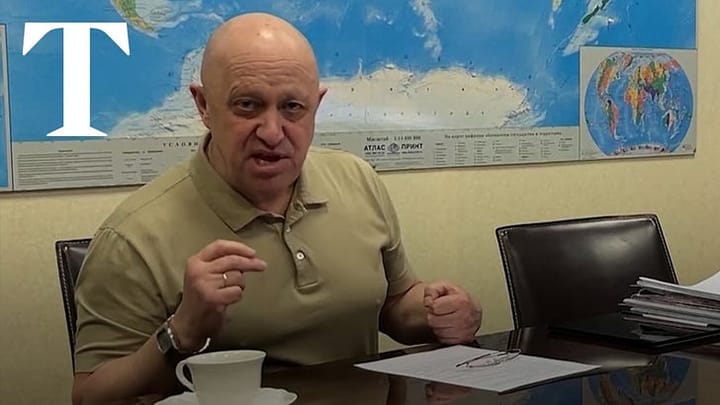The Center Cannot Hold
In Israel, everything is exploding at once.
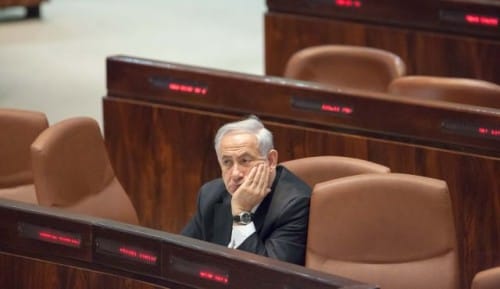
Things fall apart; the centre cannot hold
Mere anarchy is loosed upon the world,
The blood-dimmed tide is loosed, and everywhere the ceremony of innocence is lost
The best lack all conviction, while the worst are filled with passionate intensity.
— W. B. Yeats, “The Second Coming”
Israeli politics, even in the most peaceful of times, is best described as the world’s most authentic successor to the Byzantine court. An incredibly tiny nation (the entire north-south length can be driven across in about six hours, and the Old City at the core of Jerusalem can be leisurely walked through in about two), its status as the focus of Jewish ingathering for the past 75 years and near constant conflict with its neighbors for the majority of that time have kept it news-worthy, yet its most fraught decisions are usually resolved based on which old man is pissed off the most at which other old man.
These are not the most peaceful of times. And this month, specifically, Israel looks to be at the greatest threat of flying apart from its own internal contradictions since its founding. How it got here, for the curious outsider, requires a lot of explanation. Good thing this Substack is just sitting right here, huh. (Imagine trying to explain all this as a twitter thread. It’s doubtful Twitter will still exist by the time you finished reading it.) There are three basic causes to the current crisis: the Palestinian problem, Israel’s system of government, and Benjamin Netanyahu. Let’s look at all three. I promise it will be brief. Somewhat. (Spoiler: it’s very much not brief.)
The Palestinians: How do you go home when you’re already there?
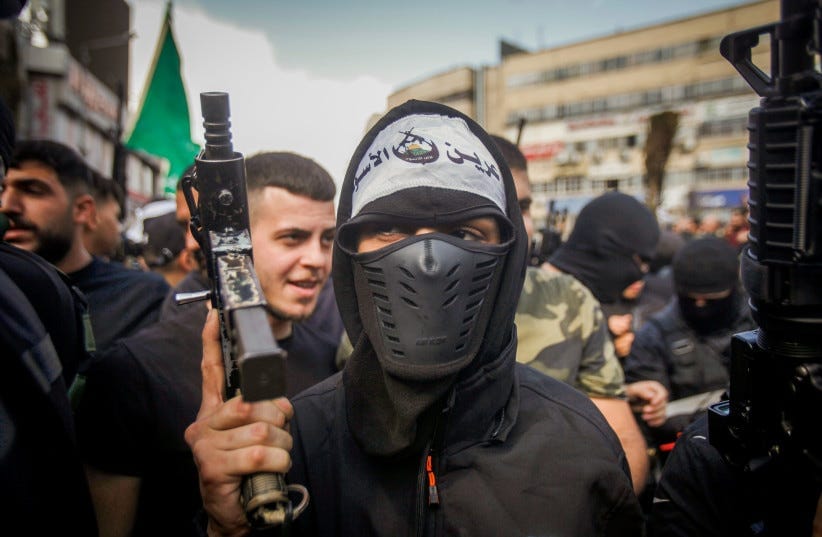
The Jews and Arabs of the area used to live in harmony, allied together. Unfortunately, that was a thousand years ago and the two were allied against the invading Crusaders who wanted to kill them both. Since France and England both stopped trying to convert the Middle East for Christ, the two groups have fought almost non-stop since; a brief pause in the fighting ended when Jews globally began returning to Palestine as part of the Zionist movement in the early 20th century. The Arabs responded with riots and massacres, the Jews responded with fighting the British who ran the place and by this point really did not want to any more, World War 2 happened and in its wake a shocked world agreed that the Jews were probably owed someplace they wouldn’t be genocided, the Arabs responded that they weren’t responsible for Hitler’s concentration camps (although they didn’t think it was that bad an idea when you think about it) and shouldn’t have their land taken away for it, and a war broke out with massive ethnic cleansing and massacres on both sides that ended with the land roughly split between a new Israeli state, Jordan and Egypt, Israel then fought a series of wars with both along with Syria that ended in 1967 with Israel in control of the Golan, Sinai, and West Bank. And that’s where it actually started.
As a result of Israel’s almost being defeated by Egypt in a war in 1973 and consequent diplomacy by Egypt’s leader, Anwar Sadat, Israel handed the Sinai back to Egypt, minus the Gaza strip. However, Israel was determined to keep the land it took from Syria and Jordan. The Syrian conquest, the Golan Heights, was deemed necessary for security reasons since otherwise Syrian artillery had a perfect firing position over a good chunk of northern Israel. (Less relevant now in the age of missiles and drones, but in 1973 a consideration.) And the West Bank was deemed necessary because it was a core part of Israel. And by core, I mean religion.

Israel suddenly found itself in control of virtually every village named in the Bible and every holy Jewish site, such as Abraham’s Tomb in Hebron, and most importantly the site of the Second Temple, razed to the ground except for one wall by the Romans 2000 years prior. Israel promptly demolished a 800 year old neighborhood nearby and created a new holy site for pilgrimages to the Western Wall. However, Islam also claimed the precise location of the Second Temple as its own holy site, where Muhammad ascended to heaven. This posed a problem; planting the Star of David flag triumphantly on Islam’s second holiest mosque would cause a holy war the likes of which had not been seen in generations. Thus Moshe Dayan, the general in command, offered to allow the Muslim religious leaders present to continue to run the place; Jews would be allowed access to visit and to pray at the Western Wall, but not on the Temple Mount itself. (This agreement has for the most part been upheld since - but we’ll come back to it.)
The problem of the Temple Mount was replicated throughout Israel’s new conquests. There were about six million Arab Palestinians who lived in the area who did not particularly want to become Israelis. The same problem, during the Independence War, was resolved by Israel forcing the Arabs to leave. A little ethnic cleansing may have been acceptable to the world in a post-World War Two 1948; it certainly wasn’t in a very much active Cold War 1967.
Israel’s response was to sprinkle the area with Jewish towns, called “settlements”. They began as “kibbutzes”, or farms that acted as paramilitary armed fortresses, which were specifically intended as a backstop to the military occupation. As time passed, those kibbutzes became villages, and those villages became cities. Currently there are believed to be over 700,000 Jewish settlers in the West Bank, living amongst their Palestinian neighbors in a situation very much not harmonious. The intent is to create “facts on the ground” - or, as Joseph Trumpeldor, a founding father of the Zionist movement put it, “Wherever the Jewish plow plows its last furrow, that is where the border will run.” That this is contrary to international law is just one of many problems with this policy; the primary problem is that the Palestinians who live there don’t particularly want to give up their land. And as the occupation goes on and on and on (it is now the longest conflict of the modern era), the Palestinians get more and more desperate about expressing their displeasure.
After repeated “intifadehs” or mass revolts, a somewhat workable peace plan was agreed to between Yitzhak Rabin, the then Prime Minister of Israel, and Yassir Arafat, the leader of the Palestine Liberation Organization, a guerilla organization notorious for hijacking airplanes and shooting Jews. Called the Oslo Accords, and midwifed by the United States, it laid out a timeline for removing the Israeli settlements from the West Bank, turning them over to a Palestinian authority, and dividing the land between two people. Finally, the conflict was ended, and peace had been restored.
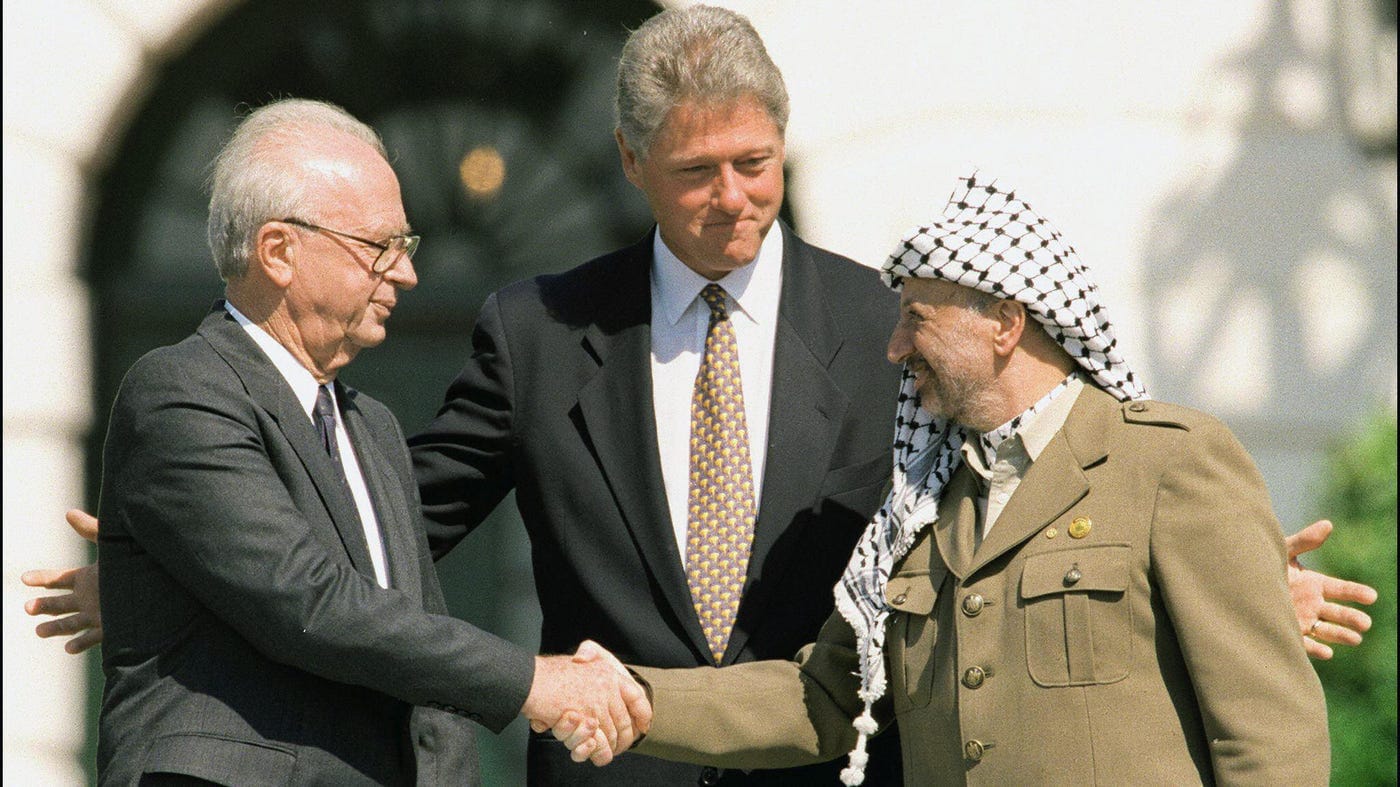
Yeah. Spoiler: it didn’t work.
Yitzhak Rabin was almost immediately assassinated by a Jewish extremist enraged at Rabin’s making peace with the devil. Israel drug its feet on withdrawing its settlements - a trial run, removing a few thousand settlers from the much less coveted Gaza Strip, resulted in near anarchy as the Israeli right revolted at the prospect of giving up any land whatsoever. Arafat refused to agree to any border compromise that would move the process forward; the ongoing rumor was that he was terrified that he would share Rabin’s fate. Instead he led a new intifadeh, was confined to his compound in Ramallah, died in somewhat mysterious circumstances and was replaced by his deputy Mahmoud Abbas; elections to name a new leader were called off indefinitely when it became clear the militant rejectionist group Hamas, that had seized control of Gaza, would win them. Abbas made peace, after a fashion, with Israel; under his rule the “temporary” Palestinian Authority structure became as its primary role Israel’s unofficial police force in the Palestinian-held territory. Palestinians who rioted found themselves facing Palestinian police instead of Israeli soldiers.
And the settlements continued to grow. And grow. They gave birth to a new, toxic far right strain of politics in Israel, spearheaded by the “hilltop youth”, anarchist, fanatically religious teenagers at the front lines of seizing Palestinian land for illegal even by Israeli law outposts (later renamed, in Orwellian fashion by the right, as “young settlements”) that they intended to, through creating more “facts on the ground”, roll what land the Palestinians lived in further and further back.
The Palestinian resistance to this became more and more desperate as the years passed and more and more villages are shoved aside to be replaced with Jewish settlements. The largest refugee camps, now so long established as to be well-established if extremely impoverished tenement cities, in places like Nablus and Jenin became no-go zones for both Palestinian police and Israeli troops; gun factories churned out poorly made handmade submachine guns that might fire once; the theory being that’s all they would need to since any attack on an Israeli soldier was suicidal. When the guns ran out, the Palestinians used knives.
Israeli’s response to these “lone wolf” attacks became more and more extreme; family members who had no idea their relative would snap and attack a soldier found themselves homeless as IDF troops bulldozed their homes in retaliation. Israeli prisons swelled with Palestinian prisoners, who only became more militant through their stay.
It’s still going on.
The latest mutation in Palestinian resistance is the “Lion’s Den” movement. What differentiates this from previous factions is that the Lion’s Den is apparently leaderless; an anonymous collective of pissed of Palestinian young teens who quit giving a shit and want to die in glorious battle. Israel has no idea what to do about them; they’ve raided the camps they appear in more and more frequently, with higher and higher death tolls. It’s not helping.
To see why, we need to look at the other side.
The Israelis: holding the same election over and over again until you get it “right”

Israel’s politics have been dominated for the past 25 years by one man: Benjamin Netanyahu, “King Bibi”. Taking power in 1996, shortly after Rabin’s assassination, and holding power with a few interruptions since, Netanyahu has turned Israel sharply rightward. His politics can be described fairly succinctly:
- Iran is the generational threat to Israel’s existence and must be confronted at all costs.
- The Palestinians will never make peace on their own and must be “managed” to the point they can be safely ignored.
- Israel’s neighbors only respect strength and don’t care about the Palestinians.
- Israel needs to jettison its socialist past and embrace being a modern capitalist economy.
Other politicians, foreign and domestic, who have dealt with Netanyahu, would describe his politics even more succinctly:
- Benjamin Netanyahu is a goddamned liar.
It cannot be overstated how much almost every Israeli politician of any ideology completely and totally despises Netanyahu. He has broken every promise he’s ever made in the service of holding personal power; his party, the Likud, has lost most of its leadership when it became clear there was no future within it for anyone not named Netanyahu and is now staffed almost entirely by Netanyahu loyalists. Thus, every election for the past 5 years has deadlocked between Netanyahu, the parties he’s managed to ally with that election, and a collective of everyone else who can’t stand him and been stabbed in the back after previous coalition attempts. After a series of elections which kept Netanyahu in office when no coalition could be formed and yet another election had to be called, he finally lost power briefly when virtually every other politician in Israel, right, left, center, Jewish, Arab, WHATEVER, all united in one coalition with one guiding principle - for God’s sake, someone not Netanyahu run this country. That government lasted longer than you’d think!
Netanyahu reacted to losing power by turning into a Jewish Donald Trump. His party stalwarts refused to treat the coalition as a legitimate government, attacking everything it tried to do at every turn, and painted the next election as a literal battle of good and evil (the evil being the not-Netanyahu factions).
A complicating factor for Netanyahu is that he was (and still is!) under trial for corruption (specifically bribery and breach of trust). You would think this would disqualify someone from running for high office. You’d think. Instead, Netanyahu’s response has been to attack the legitimacy of the entire Israeli legal system. The bribery charges in particular are almost laughably ridiculous (a tycoon gave Netanyahu some expensive cigars and some jewelry for his wife) and almost certainly a result of Netanyahu’s belief that he is above the law and thus shouldn’t worry about it.
This is a good point to briefly segue into how Israel’s legal system plays into all this. Israel has no constitution; instead it has “Basic Laws” which enumerate what a constitution normally would, passed in piecemeal fashion by the Knesset, Israel’s parliament. Israel’s Supreme Court especially, as a reaction to Netanyahu’s somewhat imperial ruling style, has established itself as a barrier against the government’s wilder impulses; ruling often against Israeli settlers who blatantly steal privately owned Palestinian land, for example. This independence absolutely infuriates the Israeli right wing, who are usually the ones being ruled against since they’re usually the ones doing laughably illegal things. Unlike in the US, Supreme Court justices are named by a nonpartisan legal group, so they are not particularly sensitive to political pressure. And oh, boy, we’ll be coming back to THIS in a hot minute.
So, when the anti-Netanyahu coalition finally collapsed (primarily because some of its right-wing members were relentlessly harassed by members of the far right and defected) the ensuing election resulted in almost a 50/50 even split between pro- and anti-Netanyahu electoral lists. HOWEVER! Israel has a fairly high threshold for list representation (established to try to keep the less popular Arab parties out of the Knesset) and two unrelated events turned out to be pivotal - a last minute split between the Arab parties (who had united to stay in the Knesset despite the high threshold) resulted in one Arab party missing the threshold wasting 140,000 votes, and more critically, the leader of the largest anti-Netanyahu party, Yair Lapid, campaigned to a large extent on taking votes away from smaller votes on the left instead of from the right. This resulted in his party, Yesh Atid, getting more seats, but it was at the expense of his coalition partners, all of whom lost significant votes - and one party, the leftist Meretz faction, for the first time in decades fell below the threshold entirely, wasting 151,000 votes. Thanks to both of these, the reapportioned list totals resulted in a narrow, but clear majority for the pro-Netanyahu parties.
And this was a problem. A big one.
You see, in previous coalitions, Netanyahu preferred to rule as a big-tent coalition, bringing in parties from both left and right, and pitting them against each other while he remained above the fray manipulating things. But thanks to Netanyahu’s years of stabbing literally everyone he’s worked with in the back, his only coalition partners this time were fundamentalist ultra-Orthodox parties out for their own very narrow interests, the far-right Religious Zionism party which campaigned on annexing the West Bank, and the even farther-right Jewish Power party which campaigned on beating the Arabs into a pulp. And they ALL demanded they get their coalition demands in writing.
And thus the disaster began.
The Collapse: What happens when the dog catches the car?

Those coalition demands were some times ridiculous (one Orthodox party demanded that Israel stop producing electricity on the Sabbath, which would surely have gone well) but mostly frightening. Bezalel Smotrich, of Religious Zionism, demanded and was given control of the military authority controlling Israeli settlement in the West Bank; this was explicitly so that no settlement would ever be uprooted, no matter how illegal or wildcat, and a step towards “sovereignty”, or a de jure annexation of the West Bank. Itamar Ben Gvir, of Jewish Power, for his part, made the quite reasonable demand he be placed in charge of the police.
By “reasonable”, I mean, of course, hysterical. You know how everyone likes to label right-wing politicians fascists these days? Ben Gvir is an actual fascist. As a teenager he got on the news for attacking Yitzhak Rabin’s car and ripping a part of it off, brandishing it before the cameras saying that they would get to him too. (Very shortly thereafter, they did, and Rabin was assassinated.) He was a part of the Kach movement, led by Meir Kahane. All you need to know about Kach can probably be expressed by its logo:
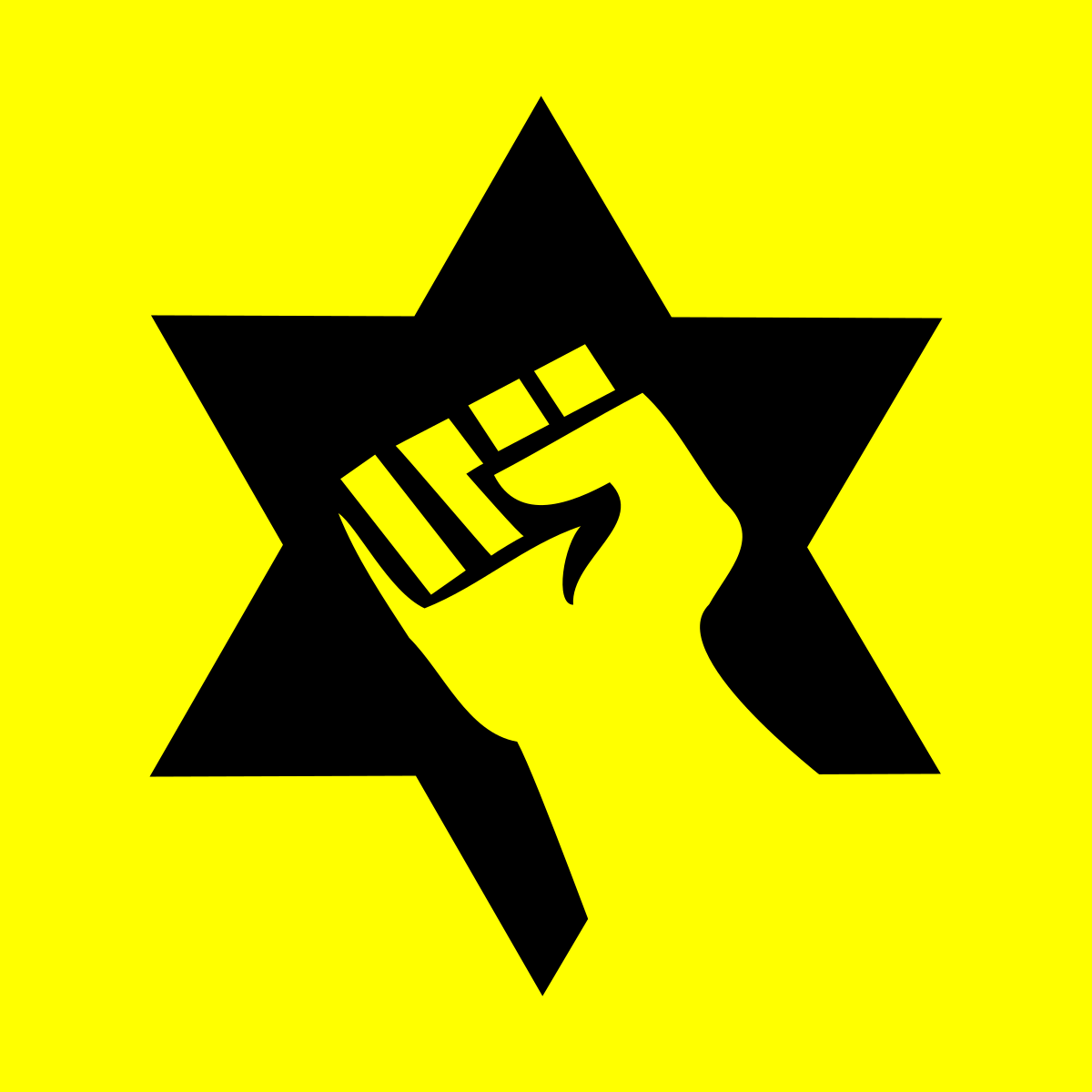
Kahane’s political positions were simple: Israel must become a theocracy, and the Arabs must be eliminated; by expulsion preferably, by other means if that doesn’t work. Another follower of Kahane, Baruch Goldstein, walked into the shrine of the Cave of the Patriarchs (Abraham’s tomb) while Muslims were at prayer (Abraham being a key figure in Islam as well), and calmly opened fire with his assault rifle at the crowd. Before the crowd managed to overpower him and pummel him to death, he killed 29 and wounded 125. Israeli society across the spectrum of politics was utterly disgusted, and Kach was finally outlawed in response.
Until very recently, Itamar Ben Gvir had a shrine to Goldstein in his home. A literal shrine, with a picture and everything.
For most of his career, Ben Gvir has been a marginal figure; he became a lawyer to defend fellow extremists hauled before the courts, and became well known as a likeable, humorous defendant of the extreme far right on Israeli TV. He became closely associated with the hilltop youth movement (one of its leaders, Meir Ettinger, was Meir Kahane’s grandson) and began running for the Knesset; Netanyahu convinced Bezalel Smotrich to put Ben Gvir on his Religious Zionist list as a partner to try to get as many right wing votes as possible for a coalition. In that election, Ben Gvir’s Jewish Power list managed to get one seat.
In this election, it got six. It’s estimated that a third of active duty Israeli soldiers voted for Ben Gvir.
Why did Ben Gvir, and the far right, become so popular in Israel? Primarily because of extreme polarization - after election after election, and a seeming unending stream of lone wolf Palestinian terror attacks, some Israelis wanted to vote for the most right wing figure possible, and Ben Gvir qualified. His campaign slogan was “It’s time to be the landlords of our country.”
And he demanded, and was given, control of Israel’s police.
Almost the very first act of the new coalition was to push forward a complete restructuring of the Israeli judicial system. Essentially everything described earlier about how the Israeli supreme court exercised oversight over lawmaking would be surgically removed; supreme court justices would be named by the currently governing coalition, and the Knesset could overrule any ruling by the supreme court regarding the legality of its actions by a simple majority.
The fact that these reforms would almost certainly result in the end of Netanyahu’s corruption trial is, I’m sure, a complete coincidence and not foremost in anyone’s mind. Another minister, Aryeh Deri, head of one of the ultra-Orthodox coalition parties, was removed by the Supreme Court after he broke his plea bargain to stay out of politics after a conviction on tax evasion; a key plank of the reforms is intended to restore him to power specifically and by name.
This caused Israeli society to explode in protest. It was very clear to everyone at this point: Netanyahu’s coalition meant to remove any brakes and restructure the very system of government so it could do whatever it wanted. And in case anyone was unclear what this would result in, Israeli settlers in response to a shooting (which was in result to yet another raid against the Lion’s Den resistance within Jenin that resulted in dozens of dead, including uninvolved civilians) stormed a Palestinian village, Huwara, and put it to the torch in a literal pogrom.
Bezalel Smotrich, when asked, said that it was a tragedy that rioters tried to wipe out Huwara. It was the state’s job to wipe out Huwara. I am not making this up. Another MK, of Ben Gvir’s party, said “we need burning villages when the IDF doesn’t act.”
There have been absolutely huge protests every weekend in Tel Aviv and elsewhere in Israel, across the political spectrum (even ex-Likud members have addressed the protesters approvingly).
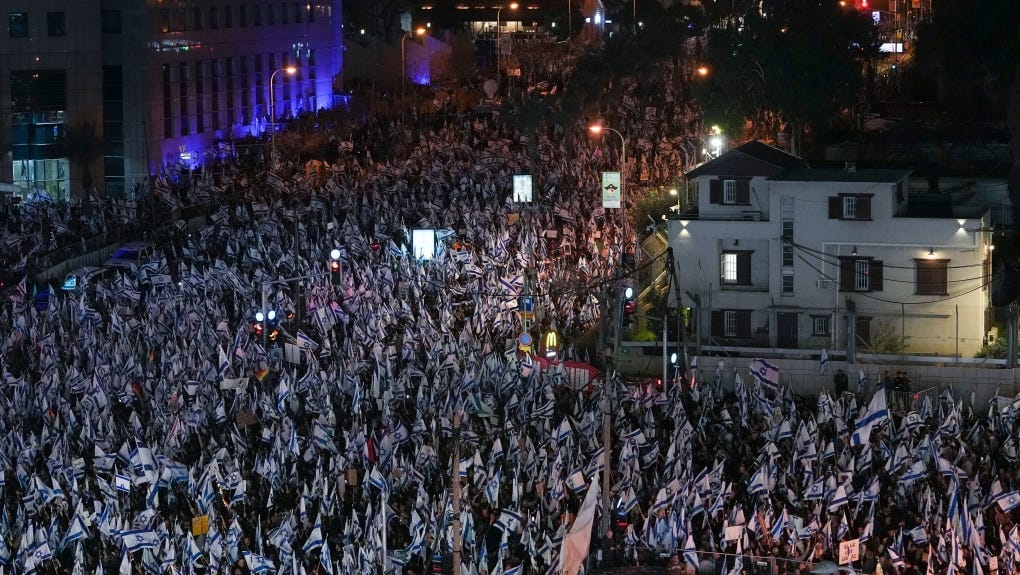
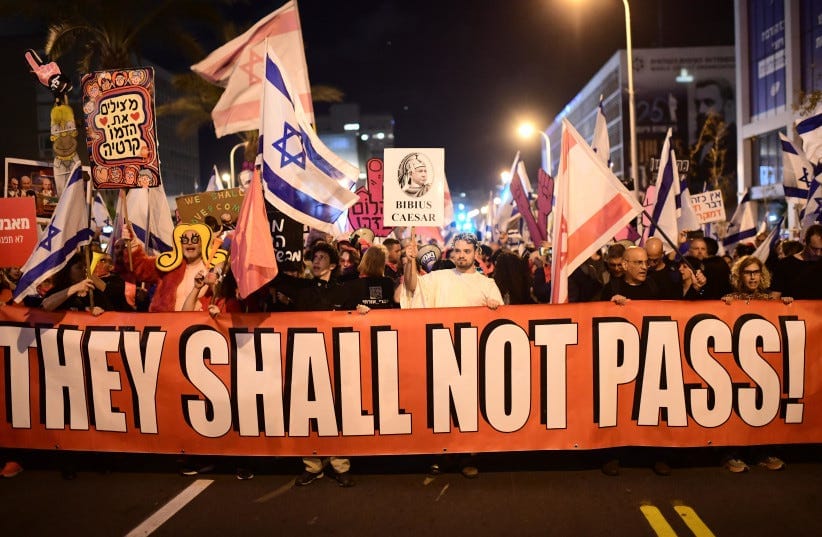
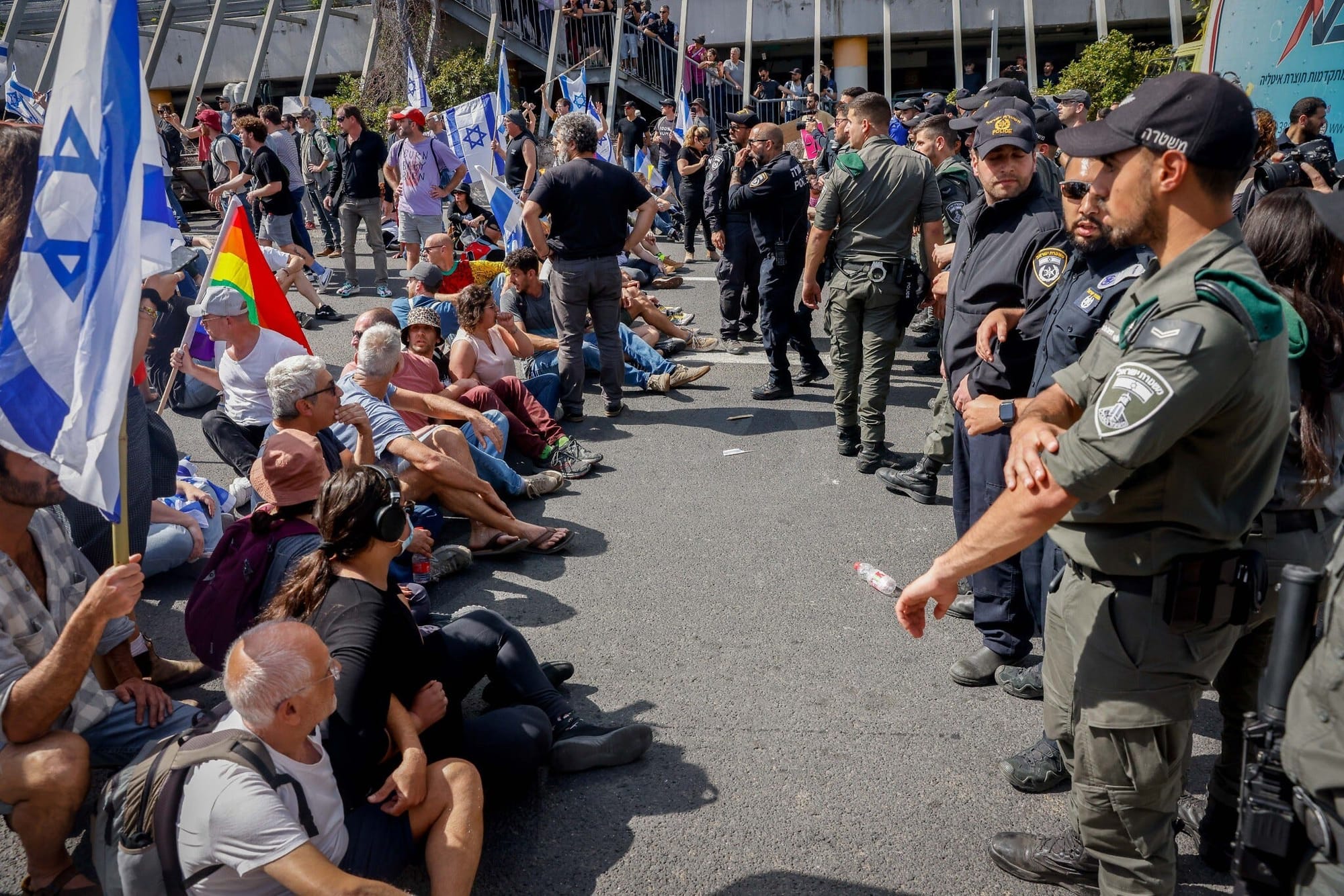
Netanyahu has in return labelled the protesters “anarchists”. Ben Gvir, in his new role as head of internal security, has demanded the police crack down harshly (those demands have been so far mostly resisted, to Ben Gvir’s publicly expressed fury).
There have been huge protests in Israel before, though, both from the left and right. However, in response to the judicial coup and the government-sanctioned pogrom, a new phenomenon never before seen is happening - a critical mass of IDF reservists, ranging from fighter pilots to elite commandos to cryptologists, are notifying their commanders “you know what? I didn’t sign up for this. If this goes through, I quit.” To quote one anonymous officer, a brigadier general in the IAF:
We didn’t hear unequivocal wall-to-wall condemnation of the lynching of Palestinians civilians by Jewish hoodlums. Instead, we heard support for these actions from some Knesset members, equivocation from ministers, and mealy mouthed condemnations from large swaths of the hard right. And then, to cap it off, Finance Minister Bezalel Smotrich came along on Wednesday with his blunt statement calling for Huwara to be ‘wiped out.’
In the past, we never doubted the righteousness of the path and the morality of decisions. Today there are question marks regarding the moral fiber of some of the decision-makers – that is why we are issuing this warning.
The IDF is utterly dependent on reservists; Israel is such a tiny country that a reserve-driven military is the only way it can exist. Without their support, it won’t function.
In response, a government minister told them to go to hell. Literally.
The people of Israel will manage without you and you can go to hell. The [judicial] reform movement will move forward. It was for this moment that we came to power.
It’s unclear how this will end, or even if it can end. The President, usually a ceremonial figure above politics, is trying to broker a compromise; the coalition is ramming through the reform proposals through the Knesset as quickly as possible with the goal of a final vote by the end of this month. At which point the Supreme Court may well rule the reform package illegal (not unreasonably, since it quite literally takes away their power to do exactly that) which would cause an existential crisis where two branches of the Israeli government are at literal war with each other. Smotrich and Ben Gvir, meanwhile, are doing their level best to ensure that the Palestinians revolt; for their part the Palestinians are doing their best to keep up their end of the deal.
And Iran is closing in on a nuclear weapon, at a time when the IDF may be paralyzed.
Israel may well be on the verge of self-destruction, unless cooler heads prevail, quickly. Very few seem to be on offer. Everything continues to be horribly, apocalyptically terrible.
